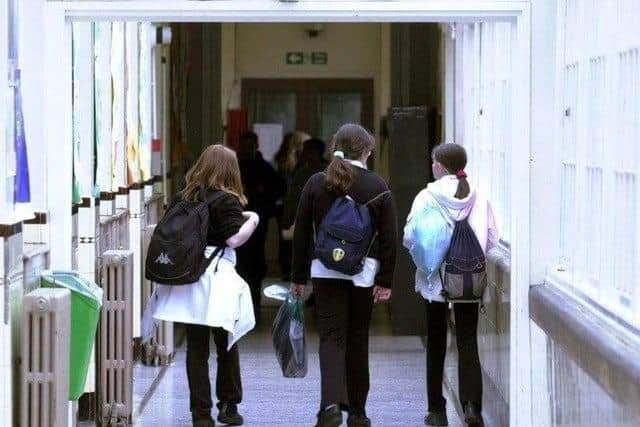School closures: Lancashire schools being inspected over RAAC concrete concerns 'as a precaution', with one so far to told to close
and live on Freeview channel 276
The authority has not identified the schools that are to be visited as part of the “precautionary” measures being taken - and declined to confirm the exact number - but it has said that it is unaware of any Lancashire schools being amongst those across England that have been told to partially or fully close their doors just days before the start of the new term. It added that it has "no safety concerns at present".
However, the county council directly controls only around half of the county’s 628 schools - with the remainder being operated as church schools or academies, which are liaising directly with the Department for Education (DfE) over the issue. Since the County Hall statement was issued, it has emerged that a Catholic school in Preston will have to remain shut “pending further investigation”.
Advertisement
Hide AdAdvertisement
Hide AdThe government has so far refused to publish a list of the affected schools, with schools minister Nick Gibb telling BBC Radio 4’s Today programme on Friday morning that he wanted parents “to hear from [their child’s] school, not read about it in the media first”.


The schools concerned were built with reinforced autoclaved aerated concrete (RAAC) - a material used largely between the 1960s and 1980s and which can fail without warning when it reaches the end of its lifespan.
Mr. Gibb said that a survey of the whole school estate began last year to establish the extent of RAAC in classroom facilities - with schools being asked to fill in a questionnaire “to say whether they have RAAC or not”
“Those surveys have been coming in and the vast majority say there is no RAAC. [For] those schools that say, ‘We might have RAAC’, we have then sent in surveyors - and they are then saying... in the majority of cases, [the schools] don't actually have RAAC.
Advertisement
Hide AdAdvertisement
Hide Ad“But in some cases they have, so we know those schools that have RAAC from those [survey] returns and we know the condition of it,” Mr. Gibb added in his Radio 4 interview.


However, Ian Watkinson, chair of the National Education Union’s (NEU) health and safety committee told the Local Democracy Reporting Service that he wanted to be reassured that the process that had been followed was rigorous enough to ensure that pupil and staff safety was “guaranteed”. At the moment, he says, there are too many unanswered questions.
“Is it the case that we have asked schools to do a tick-box exercise themselves? If so, then have all schools responded - and were they qualified to undertake this basic self-survey?
“Also, how is the local authority monitoring this? It’s not clear what their role has been.
Advertisement
Hide AdAdvertisement
Hide Ad“We'd like to think that Lancashire County Council has got - and are deploying - the resources so that they can reassure staff, parents and pupils that buildings are not at risk of imminent collapse.
“But we need a belt-and-braces approach. We want to know precisely what's [been done] and, if there are any issues or concerns that have come out of the basic self-assessment, what's happening to put those right?
“If there's any doubt whatsoever - and there's an opportunity to do a more robust survey that's going to guarantee that there are no issues - then we would welcome the resources being applied to put that in place.
"Obviously, education is paramount, but the safety of children and staff is the number one [priority].
Advertisement
Hide AdAdvertisement
Hide Ad“It doesn't inspire confidence just to say that, as far as we know, there are no issues and we're working with the DfE,” added Mr Watkinson, who is also Lancashire's representative on the NEU’s executive committee.
The risks of RAAC - whose make-up has been likened to an Aero chocolate bar - have been known about for several years. Two school roofs collapsed in 2017 and 2018, the latter at a Kent primary during the holidays.
The government says that the decision to close RAAC facilities came after a change in advice which it received this summer.
Nick Gibb said on Radio 4: “Until yesterday [Thursday], the policy was that if the RAAC was in a critical condition, then that building or room would be taken out of use.
Advertisement
Hide AdAdvertisement
Hide Ad“But where the surveyors said the RAAC was not in critical condition…the advice was that those rooms could continue to be used. What we discovered over the summer was a number of instances in schools and [elsewhere]...where RAAC that had been considered to be a low risk actually turned out to be unsafe.”
The shift in stance raises the prospect of affected schools having to find temporary classrooms or even return to lockdown-style remote learning.
The number of schools on the national closure list could yet rise, as it is not clear whether all establishments have completed their survey. It has been reported that more than 50 schools have already put mitigations in place.
In a statement, a spokesman for Lancashire County Council said: "We are not aware of any schools in Lancashire that have been told to close by the Department for Education due to the presence of reinforced autoclaved aerated concrete (RAAC) and have no safety concerns at present.
Advertisement
Hide AdAdvertisement
Hide Ad"The DfE is leading on the national investigation and is liaising directly with schools where a diocese or multi-academy trust is the responsible body.
"Of the 303 maintained schools that the county council is responsible for, visual surveys have been undertaken where a possible presence was identified - and no safety concerns were found.
"As a precautionary measure, we are now carrying out detailed surveys on a small number of schools due to their age.
"We would ask parents not to contact your school about this issue as you will be contacted by your school if your school is affected."